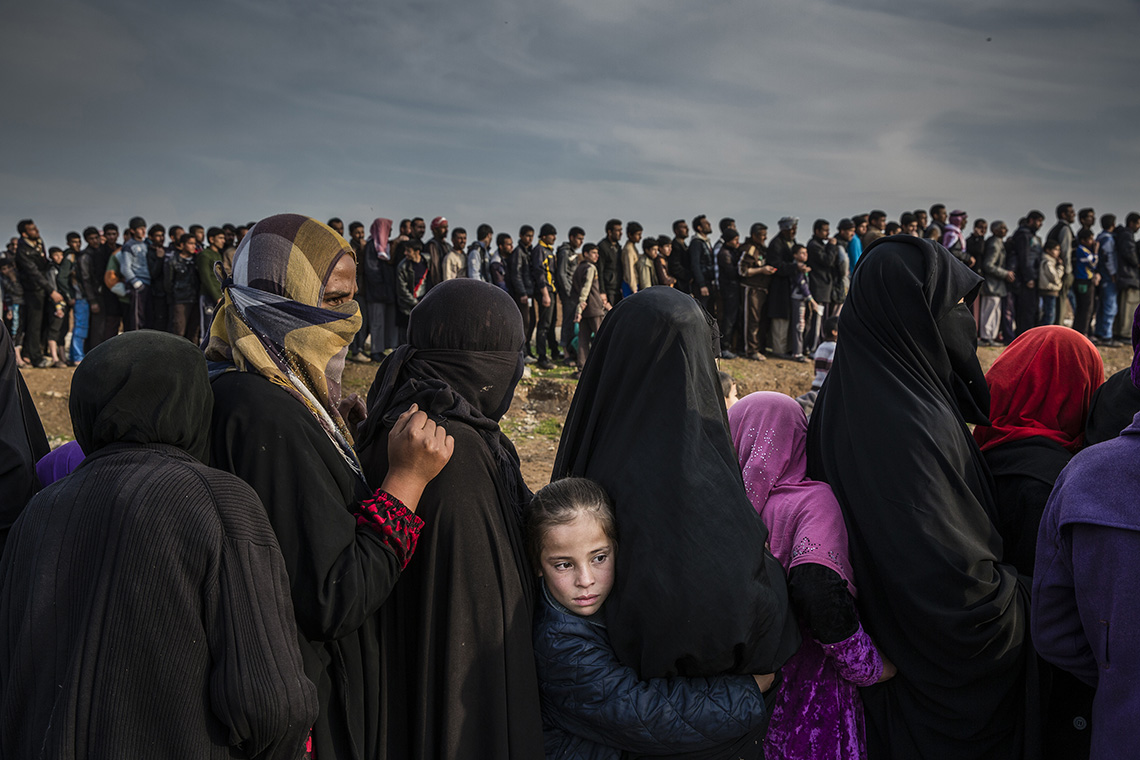Stories
2018 World Press Photo Contest nominees announced

Nominees for the 2018 World Press Photo Contest have been announced, showcasing the most striking photojournalism of 2017.
For the first time, organisers have revealed the six nominees for the World Press Photo of the Year, whose work covers major global crises, from the plight of the Rohingya people in Myanmar, through to the battle for Mosul, Iraq, and protests in Caracas, Venezuela.

Two Canon photographers are among those shortlisted for the World Press Photo of the Year award, which recognises images of great journalistic importance. Irish photojournalist Ivor Prickett has two shots (above) nominated from his series charting the liberation of Mosul, Iraq, from Islamic State of Iraq and Syria (ISIS). Contrasting sharply with one another – depicting both the mundanity of daily survival and the brutality of war – the images combine to highlight innocent children caught up in the tragedy.

In Ivor's first image, taken in March 2017, the eye is drawn to a young girl standing in a long queue of people awaiting aid being distributed in the Mamun neighbourhood of west Mosul. Ivor's second shortlisted image, shot four months later, shows a young boy being carried out of the last ISIS-controlled area in the Old City by Iraqi Special Forces soldiers. They suspected that a militant had used the child as a human shield.

Patrick Brown, from Australia, is nominated for the World Press Photo of the Year for his stark catalogue of loss, showing the bodies of Rohingya refugees who drowned when the boat they were trying to flee Myanmar on capsized off the coast of Bangladesh. Of the 100 people who got onto the boat, only 17 survived.
The other nominees for the prestigious World Press Photo of the Year are Australian photographer Adam Ferguson, for his portrayal of a 14-year-old Boko Haram suicide bomb survivor for The New York Times; Reuters' Toby Melville, from the UK, for his coverage of the aftermath of the Westminster terror attack; and Ronaldo Schemidt, from Venezuela, who documented street fighting in his country for Agence France-Presse.

This year, the renowned World Press Photo Contest drew more than 73,000 entries from around the world, from 4,548 photographers. The jury shortlisted 307 photographs across eight categories, which cover major news stories including the European migrant crisis and the liberation of Mosul, through to global features exploring the rise in convenience food in China, sport in Pyongyang, North Korea, and the use of Japanese macaques in the entertainment industry.
In the accompanying Digital Storytelling Contest, which rewards the best visual journalism from digital storytellers and filmmakers, there were 308 entries across the Short Form, Long Form, Immersive Storytelling and Innovative Storytelling categories. Nominees include The New York Times for a 360 VR video diving under Atlantic sea ice, an immersive story about a Syrian’s first year as a refugee, which ran on TIME's website, and a video about President Rodrigo Duterte’s war on drugs in the Philippines.
The great work in this contest helps us fulfil our purpose – connecting the world to the stories that matter.
Lars Boering, managing director of the World Press Photo Foundation, says the contest draws attention to stories of significance. "The best visual journalism is not of something; it is about something," he says. "It should matter to the people to whom it speaks. The great work in this 2018 edition of our contests helps us fulfil our purpose – connecting the world to the stories that matter."

Canon Ambassadors Magnus Wennman and Giulio Di Sturco are among the 42 photographers from 22 countries nominated for awards. Of these, 15 nominees – including both Magnus and Giulio – have previously won World Press Photo honours. Magnus, a Swedish photojournalist working for the Aftonbladet newspaper, is nominated in the People Singles category for his image Resignation Syndrome, showing two sisters who have been bedridden and unresponsive for two-and-a-half years in Hordal, Sweden. Uppgivenhetssyndrom, or resignation syndrome, is a condition believed to only exist amongst refugees in Sweden.
Italian photographer Giulio is shortlisted in the Contemporary Issues Singles category for his photograph charting gender reassignment surgery in Thailand. In it, Dr Suporn Watanyusakul speaks to his patient Olivia Thomas about her new body following surgery to become a woman at a hospital in Chonburi, near Bangkok.

New for 2018 is the Environment category, which has drawn diverse entries depicting the many threats facing the natural world. Conservation photographer Neil Aldridge captures the moment shortly before a young white rhino is released into the Okavango Delta, Botswana, after making a long journey from South Africa. Even though it is drugged and blindfolded by a striking red sash here, beefed-up protection from poachers means the animal's future looks bright.

The judging process
Judging the awards is a complex process that takes three weeks, and two rounds. Entries are whittled down by specialist jurors, before the chairs of each of these juries are joined by three new members to make up the general jury. Led by Magdalena Herrera, Director of Photography of Geo France and chair of the 2018 Photo Contest Jury, the general jury select the winners, who will be announced at the Awards Show in Amsterdam on 12 April 2018. The headline award, the World Press Photo of the Year, carries a cash prize of €10,000, and the winner will also be presented with a selection of camera equipment from World Press Photo partner since 1992, Canon.

The prize-winning photographs will once more tour the world in the World Press Photo exhibition, with all the images printed on Canon large-format and Arizona flatbed printers. The first exhibition opens in De Nieuwe Kerk, Amsterdam, on the same day as the awards ceremony.
To find out more about Canon EOS 5D Mark IV, visit the product page.
For more must-read stories on the World Press Photo Contest, check out our World Press Photo hub.
נכתב על ידי